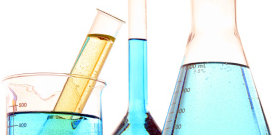The field of biochemistry combines the study of biology and chemistry. Biochemists ask questions about the chemical processes supporting living organisms. What chemical reactions occur within cells to maintain life? How do cells obtain energy, and how do they use it? How do cells react to the molecules in their environment, or send messages to another cell? Biochemists focus on the transformative properties of molecules and how their structures enable those properties. What are these structures? They are the molecular components of all living things, including proteins, lipids, carbohydrates, and nucleic acids. Biochemists ask, how do cells make these molecules? And how do cells break down molecules and recycle their component parts? These reactions involve both organic and inorganic molecules and are facilitated by specialized proteins called enzymes. In addition, biochemists ask, what controls the chemical exchange between two different parts of a cell, such as the nucleus and the cytoplasm, or the inside of a cell and its external environment? The shape and properties of biological macromolecules lie at the heart of these questions, as they permit the conversion, transfer, and storage of energy in cells and organisms.
Image credit: Klaus Hahn. Public Domain.
